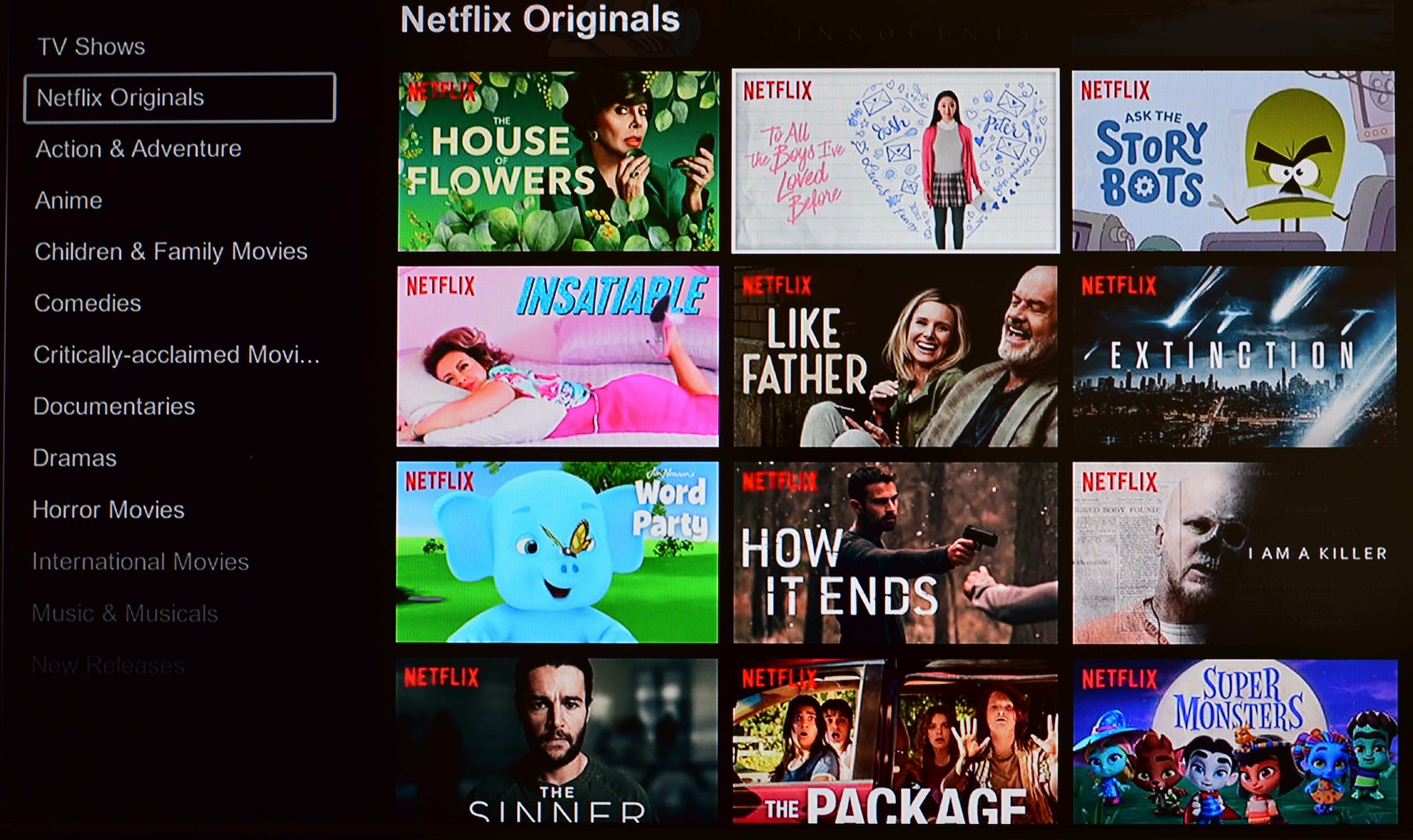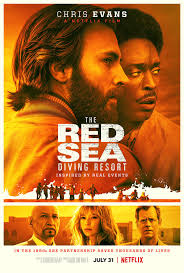The Red Sea Diving Resort (Gideon Raff, 2019) – Global Acquisition – Period Espionage
Ari (Chris Evans) is a Mossad agent (i.e. an Israeli spy) working in the Sudan in the early 1980s. When he is arrested by the Sudanese authorities for trying to help a group of Ethiopian Jews, he returns to Israel and hatches a plan to rent an abandoned diving resort on the Red Sea to smuggle the Jews out of the country. With the tentative approval of his bosses at the Mossad (Ben Kingsley and Mark Ivanir), he assembles a team of agents and returns to the country where he works with Kadebe (Michael Kenneth Williams), the leader of the Ethiopians, to evacuate the refugees while dodging the local authorities and maintaining their cover by running the resort.
The Red Sea Diving Resort is the latest in a string of period spy thrillers that Netflix has made or bought over the last two years, a list that includes the full original The Angel, and acquisitions Operation Finale and Beirut. On the series side, Netflix has also acquired and co-produced a number of titles in this vein, including A Very Secret Service and The Spy, which shares a number of connections with Red Sea, as we will see.
This also happens to be a genre that I really enjoy when it’s done well so I was looking forward to watching Red Sea in part to prepare for a binge session with The Spy. Unfortunately the film disappointed me on pretty much every level as it is badly written and directed while also being fairly offensive in ideological terms.
The film’s direction is humdrum at best and boring during what should be action sequences, most of which are badly lit and difficult to follow. But the really problems are found in the film’s script. There is little to no character development to be found in the film, with all the mains here essentially having been lifted from stock genre types. Ari, our main protagonist, is “reckless” we are told ad nauseum by other characters, and has a strained relationship with his family because he is so dedicated to his idealistic work. This is both an amalgamation of all the genre clichés as well as a hilariously naïve view of the motivations of real life spies.
Similarly Ben Kingsley and Mark Ivanir play the stock peevish bureaucrats who only exist in the film to put pressure on Ari to complete the mission and to stay on budget. This is an egregious waste of two great actors, but the worst case is found with the use of Michael Kenneth Williams. The actor who once played Omar on The Wire here is given an embarrassingly one-dimensional character that somehow goes well with the ridiculous accent that Williams adopts to play him. (Seriously, it sounds like he is prank phone-calling friends pretending to be a Nigerian price scammer.)
Many other supporting characters get no character development at all and for genre fans this was very annoying when it came to the team that Ari assembles. Instead of giving each a backstory and some kind of specialty relevant to the mission, they are just there making up the numbers.
But the worst characters overall in the film in terms of creativity and ideology are the Sudanese and Ethiopian ones. It is shocking to me that in this day and age we have in Red Sea a film in which all Africans are either bloodthirsty rapists (like the Colonel and his men), corrupt politicians (e.g. the Minister of Tourism) or pitiful victims waiting for white people to rescue them or employ them.
This is just the beginning of the film’s ideological problems however as its celebration of Israel’s supposed progressiveness towards Africans and refugees generally is appalling and even propagandistic, particularly in the age of Benjamin Netanyahu, whose name literally translates in Hebrew to “The Middle East’s version of Donald Trump”. I may have made that up, but it is very grating to see the film earnestly put forward such a view of Israel, an apartheid state that (in political terms) harbors nothing but hostility for its Muslim neighbors and citizens. Suspicions about how intentionally propagandistic the film was meant to be are heightened by the fact that it was produced by Alexandra Milchan, the daughter of Arnon Milchan, who besides being a successful Hollywood producer also worked as an Israeli spy and who has close personal ties to Netanyahu himself, having recently been implicated in a bribery scandal involving the Israeli prime minister.
So I clearly did not like the film. So why not give it one star and label it a hot mess? Mainly because the film is coherent in narrative terms and has sufficient production values to be watchable. Otherwise, it has little to offer and I would advise steering clear. Hopefully The Spy – which was written by Gideon Raff, the writer-director-producer behind this film – will be better.
Netflix Tendencies
Netflix Stars
There are numerous star connections between the film and the wider body of Netflix original production and/or significant licensed content. These include the following actors:
- Chris Evans who appears in the many Marvel films that Netflix continues to have under license.
- Michael Kenneth Williams, who also appears in the miniseries Now They See US.
- Michiel Huisman also appears in The Guernsey Literary and Potato Peel Pie Society.
- Ben Kingsley also appears in The War Machine and Operation Finale.
Beyond the actors, the aforementioned Alexandra Milchan produced this film as well as The Silence.
Writer/director Gideon Raff has showrun a number of important licensed Israeli series that are available on Netflix, including the original version of Homeland and the highly regarded Hostages, among others. Raff also wrote and showran the Netflix original series The Spy, which was released about 6 weeks later than Red Sea.
Conspicuous Product Placement
In a laughably obvious bit of product placement, the corrupt tourism minister that was overseeing the permits for the Diving Resort, abruptly stops at a Mr. Pibb machine and apropos of nothing explains its flavor to a bemused Ari.
Notable Corporate Alliance/Studio Leftover
Part of the acquisition process in the case of Red Sea involved buying some rights back from co-financier STX. This is the second project which Netflix did this with STX, the other being the much-anticipated film The Irishman. As STX has theatrical distribution operations in the US and the UK, this would mean that company gave up on its theatrical release plans for the film.
An interesting indication of just how close the relationship between STX and Netflix were at the time that Red Sea was bought (February 2019) is that shortly after the deal closed (March 2019) the STX executive who oversaw the deal, David Kosse, left his post to go work for Netflix.


[…] Lionheart is remarkable for being the first Nigerian film acquired by Netflix and only the second film from the indigenous sub-Saharan African industries to be acquired by the streamer (the first was the South African film Catching Feelings). These, along with a few series that the company has bought or commissioned, are welcome steps if they lead to greater investment in the region and more offerings to the audiences of the continent and its diaspora. But let’s not kid ourselves, Netflix’s activities in Africa have heretofore been pretty limited and the service still mainly features externally produced representations of the continent that range in quality and ideology from the very good (e.g. the series Black Earth Rising) to the very poor (e.g. the awful white savior film The Red Sea Diving Resort). […]
LikeLike
[…] is not the only film that Netflix bought off of STX, having done the same with the completed film The Red Sea Diving Resort. Tellingly, after the completion of both deals, STX executive for international cinema David Kosse […]
LikeLike